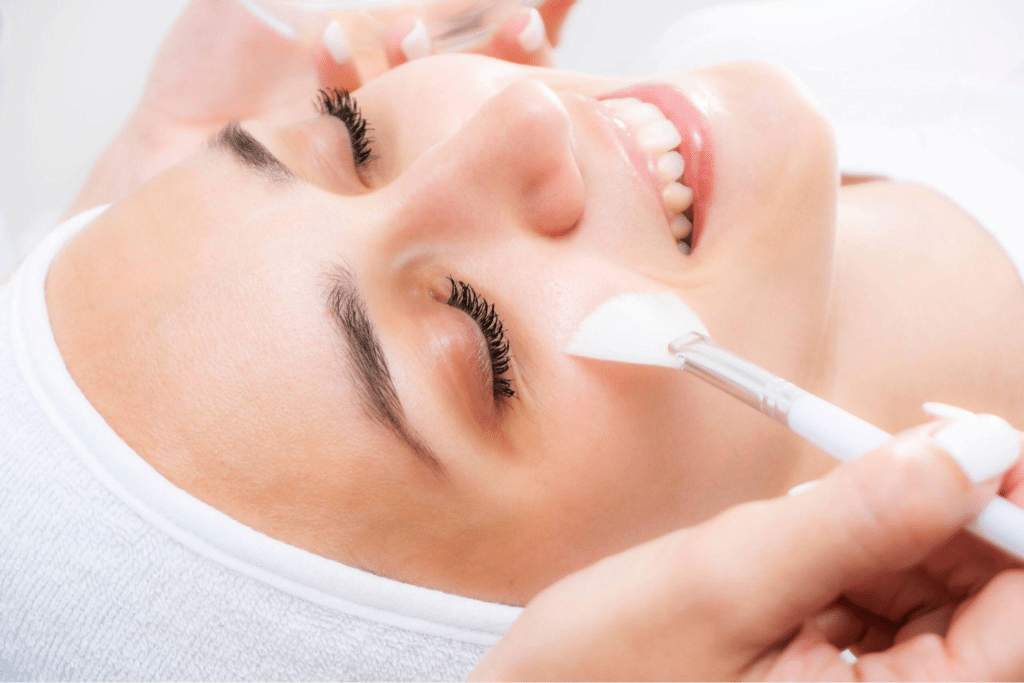
Sunburn, acne, and aging can cause dark patches and pigmentation. Numerous treatments exist for reducing their appearance; however, chemical peels offer a notably effective option. This blog post examines five ways in which chemical peels aid the reduction of dark spots and pigmentation.
1. Improving Skin Texture and Tone
Chemical peels smooth and even skin texture and tone by removing dead skin cells. This treatment removes dark spots and pigmentation while enhancing health and appearance.
Here are some tips for smoother, more even skin:
A good skincare routine involves several steps:
Start by using a mild cleanser to eliminate pollutants from your skin. Since dead skin cells can block pores and make the skin appear dull, exfoliation is essential. thus exfoliation is needed. Moistening, which hydrates and nourishes your skin, is next.
However, there is yet another critical action you must not overlook applying sunscreen; it protects against harmful UV rays from sun exposure a potential cause of premature aging or even skin cancer.
Incorporate serums that contain beneficial ingredients: for instance, vitamin C or retinol; these substances are known to boost skin health. Beyond this step prioritize hydration, maintain a balanced diet, and ensure sufficient sleep: they form the foundation of optimal skincare.
Furthermore, manage stress effectively; avoid smoking entirely as it contributes significantly towards premature aging and limit alcohol consumption to moderate levels only. Before making major changes or considering professional treatments: consult a dermatologist this ensures your decisions align with your unique skin type and concerns.
2. Targeting Specific Areas
Dermatologists can customize chemical peels to target specific skin areas. If, for instance, you possess dark spots on your face; a specialist might recommend a facial-specific chemical peel in Bangalore. Similarly, should these blemishes appear on your legs or buttocks – an appropriate choice could be body-focused chemical-peel treatment.
Here are Some Tips For Addressing a Specific Areas:
Consider utilizing specific ingredients and treatments to address an array of skin concerns like does chemical peel removes dark spots, fine lines, acne breakouts, sagging skin even large pores. Some effective options include Vitamin C; niacinamide; and alpha arbutin – an extract from licorice root; these elements can significantly lighten any existing hyperpigmentation.
Furthermore, retinoids and peptides not only reduce the appearance of wrinkles but also stimulate collagen production: a vital process for maintaining youthful-looking skin. Acne can be treated with salicylic acid or benzoyl peroxide, while retinoids aid in skin renewal and diminish acne scars. In addressing sagging skin, the application of antioxidants such as vitamins C and E combined with retinoids–proves effective for firming and tightening.
Finally, to maintain clear pores and minimize their appearance use products infused with salicylic acid and retinoids for large pore management. Consult with a skincare expert and try different products to find the best routine that suits your skin.
3. Stimulating Collagen Production
Chemical peels for dark spots improve skin health and attractiveness by eliminating pigmentation and increasing collagen synthesis. Here are several methods to enhance collagen production:
Topical retinoids such as retinol and tretinoin, along with stable forms of Vitamin C like ascorbic acid: these are just a few skincare ingredients that actively promote collagen production; they also improve the texture of your skin.
It’s worth noting – their mechanism is not passive! They stimulate synthesis in particular exciting news for those seeking to boost youthful elasticity or address scarring issues. Moreover, Vitamin C isn’t simply an antioxidant it directly aids in collagen synthesis too! Amino acids, known as peptides, provide instructions to the skin for increased collagen production; this effect is particularly targeted in products addressing fine lines and wrinkles.
Glycolic acid along with AHAs not only exfoliate the skin but also promote texture improvement through their ability to stimulate collagen synthesis. Similarly, Microneedling enhances firmness and texture by puncturing the skin which triggers an increase in collagen and elastin synthesis.
Forma and Morpheus8 are radiofrequency therapies to enhance collagen production and tighten it. Similarly, Ultherapy – an ultrasound therapy; stimulates deeper skin layers’ collagen for a non-invasive lifting effect. Consuming collagen-rich foods or supplements such as bone broth supports the internal synthesis of collagen.
4. Reducing the Appearance of Acne Scars
Chemical peels work by stripping away the top layer of damaged skin, revealing smoother and more evenly-toned skin beneath, and can be effective in reducing the appearance of acne scars. Furthermore, through their ability to stimulate collagen production, they offer an additional advantage: enhancing the overall look of acne blemishes.

Here are Several Techniques You Can Employ to Reduce the Visibility of Acne Scars:
Vitamin C: known for its ability to lighten with a chemical peel for hyperpigmentation further boosts collagen synthesis. Inflammation reduction and improvement in skin texture are the effects of Niacinamide; AHAs, along with BHAs – they exfoliate to renew our outermost layer.
Microneedling: this process involves creating minuscule punctures an action that stimulates collagen production while minimizing scars. Chemical peels enhance skin texture and reduce scar visibility by exfoliating the epidermis.
Laser therapy, on the other hand, increases collagen production in deeper layers of the skin to diminish scars.
Meanwhile, dermal fillers offer a temporary solution for filling depressed scars. Over time, silicone-based products soften and level scars; cortisone injections, on the other hand, flatten raised or inflamed scars.
To prevent further damage a crucial step–one must employ sun protection. Improving acne scars necessitates time, and keys to this process are consistency and patience; therefore – consult a dermatologist: they will determine the most appropriate approach for your specific skin type and scarring conditions.
5. Enhancing the Effects of Other Treatments
Chemical peels can also be utilized to amplify the results of other treatments. Laser treatment or microdermabrasion with a chemical peel for dark spots before and after may work better. Chemical peels may also boost Botox and filler results. Here are some general tips for increasing the effectiveness of your skincare treatments:
Maintain a consistent skincare routine: follow product instructions meticulously; conduct patch tests for new products. Gently exfoliate to remove dead skin cells, and ensure hydration of your skin with an appropriate moisturizer this will enhance absorption of the products you use.
Daily use of sunscreen protects against UV damage and preserves treatment effects; furthermore, adopting a balanced diet one rich in antioxidants, vitamins, and minerals along with maintaining hydration is advised.
Evade the use of harsh or irritating ingredients; exercise patience for noticeable results. Peptides, being a viable option, enhance collagen production: for hydration consider incorporating hyaluronic acid. With each season’s change adjust your routine accordingly and rotate products consistently to sustain their effectiveness.
Implement stress-reduction techniques to address lifestyle factors such as stress. Vigilantly monitor your diet and exercise routine, while consciously avoiding excessive consumption of sugar and processed foods. Prioritize high-quality sleep for optimal skin repair and regeneration.
To conclude, the best chemical peel treatment in Bangalore provides a versatile solution to do chemical peels get rid of dark spots and pigmentation. These procedures enhance skin texture and tone, focus on specific areas of concern, and activate collagen production; they also minimize the appearance of acne scars while amplifying the effects of supplementary treatments.
Incorporate chemical peels into your skincare routine: follow an all-encompassing approach that spans sun protection hydration with a professional guide; this will allow you to effectively tackle dark spots and pigmentation ultimately yielding smoother, more even-toned skin.
Ensure you consult a dermatologist: they will determine the optimal approach for your specific skin type and concerns; moreover, they guarantee through their expertise that your skincare routine remains both safe and effective.

